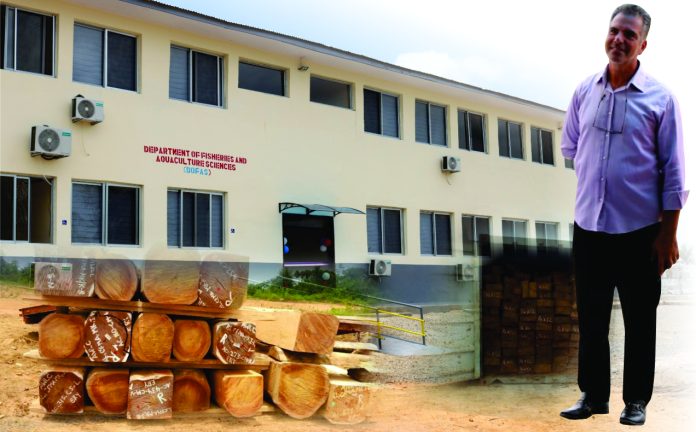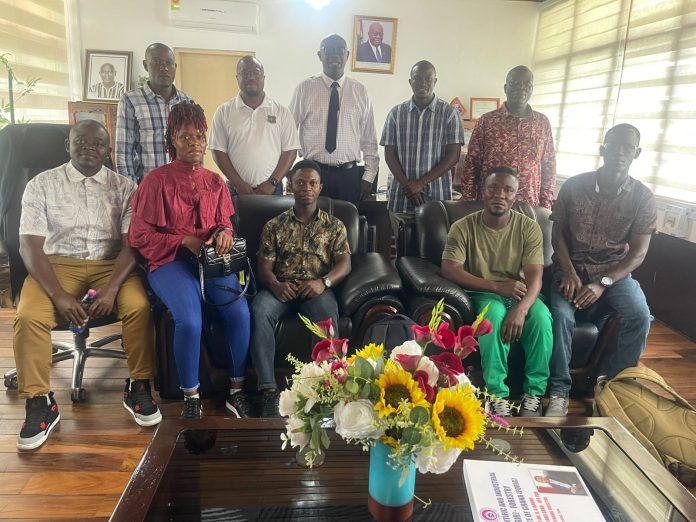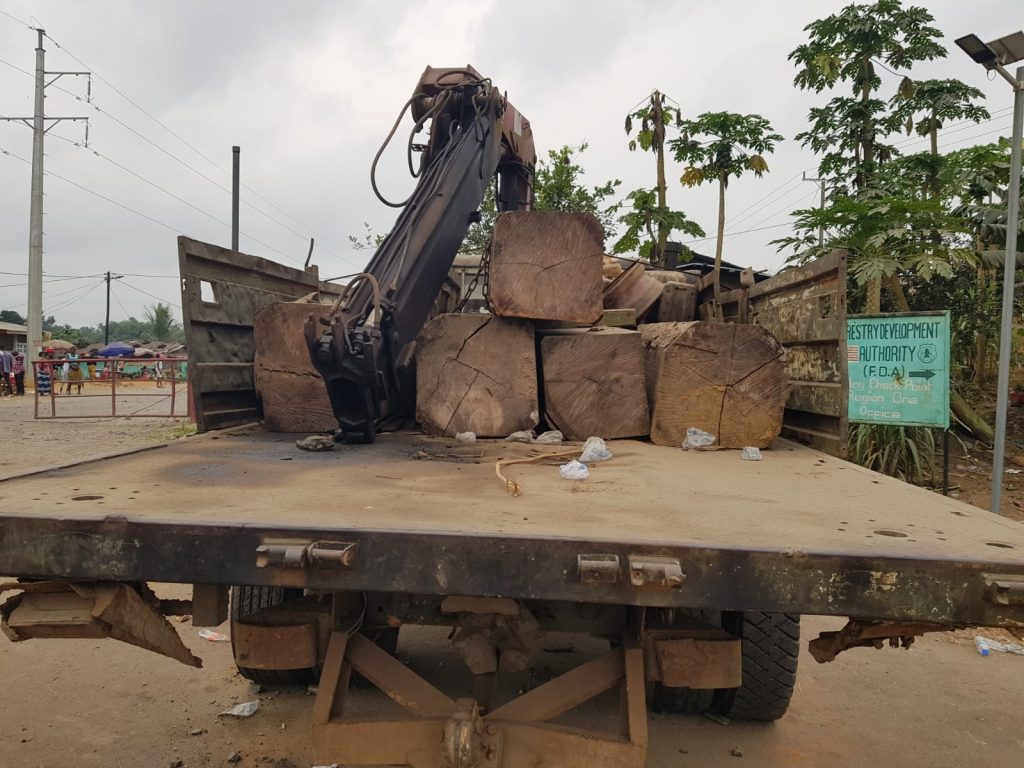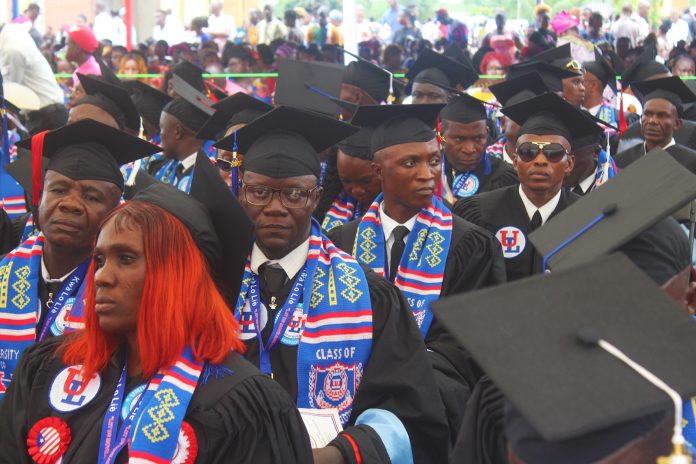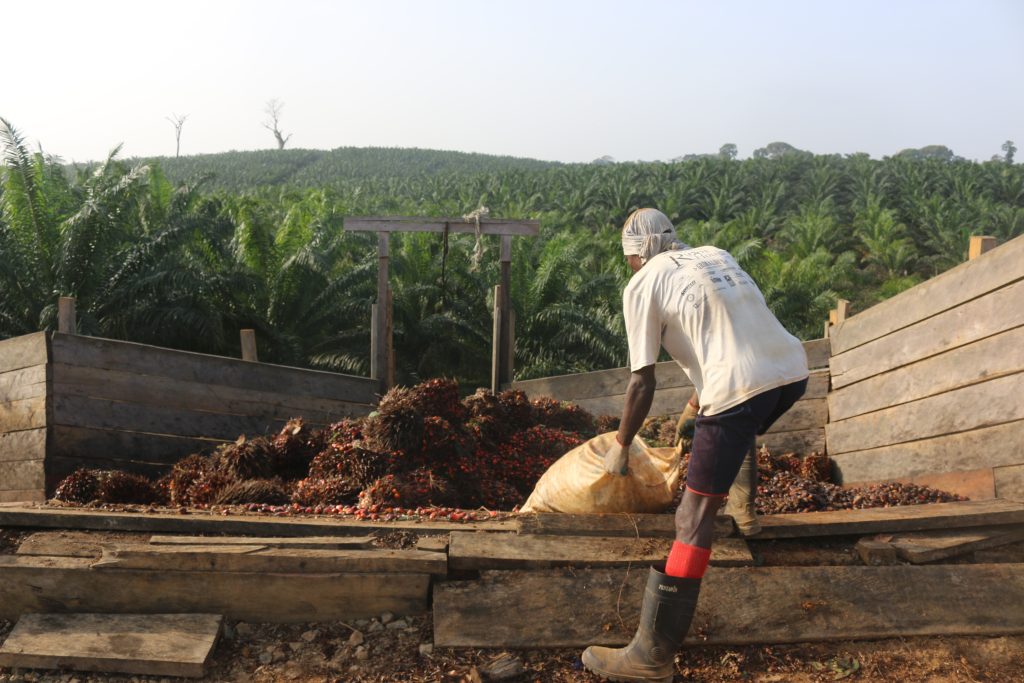Top: A graphic depicting Lebanese businessperson Moussa Abdul Karim, the University of Liberia’s department of fisheries and aquaculture sciences and timber advertised, and timber blocks Karim advertises on his WhatsApp profile. Graphic by Rebazar Forte and pictures by Franklin Nehyalor
By Varney Kamara
Editor’s Note: This is the first of a two-part series on a Lebanese businessperson’s illegal activities.
- In 2023, Mak Enterprises won a bid to construct the fisheries department at the University of Liberia, valued at nearly US$500,000, provided by the World Bank.
- Mak’s owner, Moussa Abdul Karim, smuggles timber, including a US$350,000 consignment, a year before the bid.
- Between 2017 and 2025, Karim evaded payments for work and resident permits, bringing into question Mak Enterprises’ eligibility for the contract.
- Official documents identify Karim as a Lebanese. However, Immigration authorities revealed Karim also holds a Guinean passport—another offense.
- Authorities say they would investigate Karim.
MONROVIA – On March 29, a distinguished crowd gathered at the University of Liberia’s Fendell campus to witness the official handover of its fisheries and aquaculture sciences department. Managed by the National Fisheries and Aquaculture Authority (NaFAA) with support from the World Bank, the state-of-the-art facility features 28 rooms.
The two-story building was constructed by Mak Enterprises Incorporated, a Lebanese-owned real estate company established in April 2017, according to its articles of incorporation and business registration certificate. The company had defeated 20 other bidders to win the bid for the US$498,203.52 contract, intended to improve Liberia’s fisheries sector.
“This facility will serve as a beacon of knowledge, training future generations of fisheries professionals, scientists, and policymakers who will drive the sustainable development of Liberia’s vast marine resources,” Dr. Layli Marpanyan, president of the University of Liberia, told the dedication ceremony.
Perhaps, what no one knew was that Mak Enterprises’ owner, Moussa Abdul Karim, was involved in illegal timber trafficking, tax evasion and money laundering. Karim’s illegal activities have defrauded the Liberian Government of tens of thousands of United States dollars for nearly a decade, a DayLight investigation found.
The findings raise questions as to how Mak Enterprises won the bid to construct the fisheries college when the other bidders failed due to noncompliance. The second part of this series will investigate Karim’s path to clinching the contract, including his company’s tender.
A year before winning the bid, Karim exported a US$135,000 worth of sawn timber through his second company, Mak Timber Group Liberia Inc. The buyer was Popular Export & Import Company of Bangladesh, according to the Ministry of Commerce & Industry’s records. Mak Timber Group’s tax history shows no payments for timber transport, permit, export and phytosanitary certificate, a Ministry of Agriculture document that certifies that the timber is pest-free for shipment.
Forestry Development Authority (FDA) records show that the export occurred outside LiberTrace, the legal channel through which timber is traded in and out of Liberia. It is a crucial part of Liberia’s timber trade agreement with the European Union, known as the Voluntary Partnership Agreement (VPA). Liberian Timber trade is strictly regulated under the National Forestry Reform Law and the Regulation on Establishing a Chain of Custody System, which requires timber harvest, transport, export, and associated payments to be recorded in LiberTrace.
Experts say Liberia loses about US$1 billion each year due to these illegal financial transactions. In 2023, the US-based Associated Press reported that 70 percent of Liberian timber is perhaps exported outside the legal channel, citing diplomatic sources.
‘Exotic timber’
Apart from the lone export, there are no other traces of Karim’s illicit timber trafficking, but social media provides some clues. Pictures of the wood advertised on Karim’s WhatsApp profile show timber blocks, commonly called Kpokolo, in large and medium sizes, bearing a striking resemblance to other documented timber smugglers.
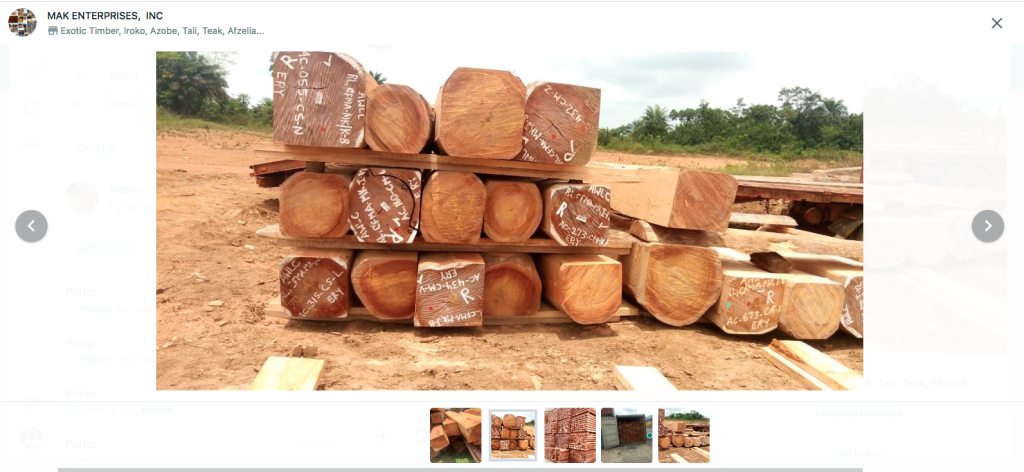
The pictures share the same caption: “exotic timber & services,” under the banner “Mak Enterprises Inc,” a combination of Karim’s wood and construction businesses. In one picture, timber blocks are shown neatly parked in a container. In another, a man stands behind a pile of gigantic timber blocks on an open field.
Most of the timber in the pictures are marked “AWLC” for African Wood & Lumber Company, which has a contract with the Marblee & Karblee Community Forest in Compound Number Two, Grand Bassa County. Cesare Colombo, African Wood & Lumber’s owner, denies having any connection with Karim or his company.
“We don’t know who those people are, we do not have any connection or discussion with them. I just received this information from you and I will take all the necessary action to avoid this kind of problem,” Colombo said in an email reply to The DayLight.
Tax histories of Mak Enterprises, Mak Timber Group and Atlantic Developers & Logistics—Karim’s third company—revealed he evaded more than US$12,000 for work and residents permits between 2017 and 2025.
The DayLight estimated the value based on official prices: non-Africans pay US$1,000 for a regular work permit, and US$750 for an initial resident permit and US$350 for a renewal. We separately multiplied those figures by nine years, the lifespan of the oldest of Karim’s companies, and added the products. The amount did not include fees that Karim did not pay to the FDA or the Ministry of Agriculture.
Per the work permit regulation, foreign nationals doing business in Liberia must hold valid work permits or risk fines, ranging from $1,000 to $10,000, including sanctions or expulsion.
Similarly, foreigners residing and doing business in Liberia without a resident permit violate the Aliens and Nationality Law. The law obligates non-Liberians to obtain a resident permit, and failure to do so constitutes a violation, whose penalties include fines or deportation.
The Ministry of Labor and the Liberia Immigration Service (LIS) confirmed that they did not have any records of Karim, except for one instance.
“We have checked the system and did not find any payment records there,” said Ralphael Donokolo II, Assistant Minister for Alien Registration and Liberianization at the Ministry of Labor.
In 2021, Karim paid US$150 for a resident permit under Mak Timber Group with a Guinean passport, according to the Liberia Immigration Service. However, the business registration certificates of Mak Enterprises and the other companies indicate that Karim is Lebanese. This was corroborated by a 2016 court case involving Mak Enterprises, where a judge was suspended for one year for soliciting a bribe, only to eventually rule in Karim’s favor.
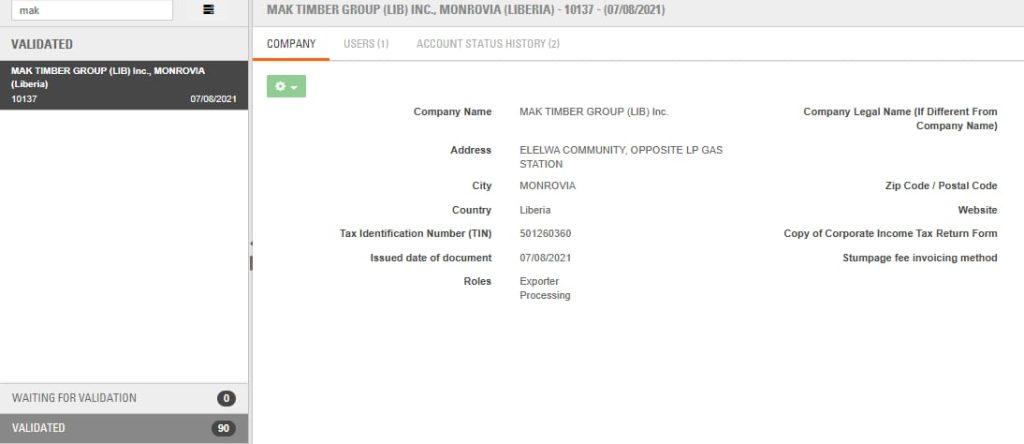
By law, Karim is required to provide his “full and true name” and accurate information when applying for visas, resident permits, or other official documents. Using multiple identities constitutes fraud and can lead to expulsion, deportation, and criminal prosecution for violators.
“You cannot carry two identities in Liberia as an alien,” said Elijah Rufus, Commissioner General-designate of the Liberia Immigration Service, via WhatsApp.
Karim did not respond to queries. He evaded detailed questions The DayLight posed to him through WhatsApp text messages and repeated reminders. Joseph Bennett, his lawyer, did not return the queries either.
Labor and immigration authorities disclosed they were investigating Karim, based on The DayLight’s queries. Donokolo said, “In line with the law, he will be fined USD3,000, plus additional USD1,000 for accepting to work without a valid work permit.”
This story was a production of the Community of Forest and Environmental Journalists of Liberia (CoFEJ).

